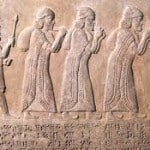When one thinks of “exile” one thinks of punishment.
” My G-d will cast them away, because they did not hearken unto Him; and they shall be wanderers among the nations.(Hoshea 9:17).Then again in the book of Deuteronomy we read; ” Hashem will bring thee, and thy king whom thou shalt set over thee, unto a nation that thou hast not known, thou nor thy fathers; and there shalt thou serve other gods, wood and stone. 37 And thou shalt become an astonishment, a proverb, and a byword, among all the peoples whither Hashem shall lead thee away. “( deuteronomy 28:36-37)
One is then left with a dramatic question. Why did the Israelites have to go into exile? What was their sin? Why did they have to endure hundreds of years of slavery and oppression? Most importantly then , what was the purpose of their exile?
We know that it is true that Avraham is told “Know for certain that your descendants will be strangers in a country not their own, and they will be enslaved and mistreated four hundred years.”(Genesis 15:13). Yet that promise and covenant itself begs the question even more passionately.
The Sefat Emet teaches on the words“In a flame of fire from the midst of that bush.” (Exodus3:2) that the words are meant to show “there is no place devoid of the divine presence—not even a thorn bush. Furthermore, that this in fact is the essence and the purpose of exile. It is in exile that Israel can make visible to the world that Hashem’s kingdom is indeed everywhere. To truly understand the word galut (exile) then is to understand its connection to the word hitgalut (revelation). Exile becomes a tool of revelation.
Reb Levi Yitzchak goes down a different path. He quotes the Baal Shem Tov in explaining “exile” in terms of a father teaching a child how to walk. At first the father holds his child’s hands and walks with him. Then he lets go and moves a short distance away and then catches the faltering child. Eventually the distance grows and in the midst of the gap the child learns to walk.( Kedushat Halevi ; Shmot). The “midst of that gap” becomes the period of exile.
Why then must that exile be so bitter and tragic. The answer to this powerful question has no definitive and simple answer that can be understood in this mortal life. Yet hints regarding the answer are found in the complicated matrix of G-d’s desire and allowance for “free choice”. They are also found in the simple truth that while the goal and destiny remains constant, the quality of the journey towards those goals becomes a function of what type of vessel we become. Exile can be gentle or can be harsh. It is a function of what type of vessels we have become.
Yet we clearly see throughout the history of the world that Hashem always appears first in all His glory and then His name becomes hidden. That is the essence of Exile-Galut. Hashem expects that his people function in a way that reveals that which is hidden. If the Jewish people are going to be used to help facilitate that revelation they are going to have to learn to walk that long road. They will need to enter exiles and wilderness and gain the strength to become that vessel.
“For this is G-d, our G-d forever and ever; He shall lead us eternally (al Mot). ” (Psalms 48:15) .The Baal Shem Tov reads the final words as one word (almut) related to the word Neelam or hidden. That is to say that Hashem will lead us using His Hiddenness.
Exile brings about yearning and yearning brings forth spiritual strength and faith.
Spiritual strength and faith are the ingredients of redemption.

